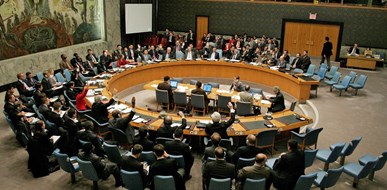[New blog post] Limiting the veto in the face of jus cogens violations: Russia’s latest (ab)use of the veto
Published 12 May 2022
Photo credit: United Nations
In a new blog post for international law blog OpinioJuris, Asser Institute intern Florent Beurret discusses Russia’s latest (ab)use of the veto in the Russian-Ukrainian conflict, while arguing that existing veto limits in the face of jus cogens violations need to be formalised to have a real effect.
No international lawyer was surprised when on 25 February 2022, the day after Russia started its invasion of Ukraine, Russia vetoed a UN Security Council draft resolution which would have ordered Russia to cease its act of aggression, a jus cogens violation, against Ukraine. As a jus cogens norm, the prohibition of the act of aggression enjoys hierarchical superiority to all other norms and principles of international law, making it non-derogable for all states. It is therefore highly problematic, and paradoxical to a certain level, that while Russia has violated one of the highest hierarchical norms in international law, it can use its veto power as a Permanent Member of the Security Council to block any appropriate response that could end Russia’s aggression.
Formalising existing veto limits
In his blog post ‘Limiting the Veto in the Face of Jus Cogens Violations: Russia’s Latest (Ab)use of the Veto’ Beurret writes that veto limits in the face of jus cogens violations do currently exist in international law. For example, under Article 41(1) of the International Law Commission’s Articles on State Responsibility for Internationally Wrongful Acts (ARSIWA), states have a duty to “cooperate to bring to an end through lawful means any serious breach” of a jus cogens norm. Thus, a Permanent Member of the Security Council has a duty to cooperate and to refrain from using the veto power in order to end a situation of a “serious breach” of a jus cogens norm. However, Russia’s disregard for jus cogens and existing veto limitation has demonstrated that there is a need for a formal implementation of veto limits. Beurret: if a large enough majority of States collectively and openly state that current veto limits exist and that Russia has acted with complete disregard to jus cogens through its veto, the political pressure might strengthen the discussions around formally implementing veto limits, or even reshaping the entire veto system as a whole.
Read the full blog post.
Florent has recently finalised his master’s degree in Public International Law (International and European Law) at the University of Amsterdam. He wrote his master’s thesis on whether legal limits to the veto power of UN Security Council permanent members exist based on jus cogens and the UN Charter. Within this master’s program, he was also selected to participate in the Fair Trials Clinic (part of the Amsterdam Law Clinics) in which he monitored and analysed the fairness of free speech trials with regards to procedural rights and international and European human rights. At the Asser Institute, Florent will primarily be assisting with various projects in the strand ‘In the public interest: accountability of the state and the prosecution of crimes’.
